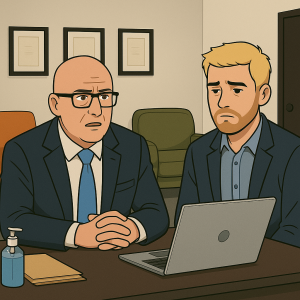1. Victim and Witness Rights
- Wisconsin Department of Justice – Office of Crime Victim Services
Offers support for crime victims including compensation, advocacy programs, and information on legal rights and protection orders. - WI Crime Victim Rights
Details statutory rights of victims and provides guidance for accessing victim services throughout the legal process.
2. Free and Low-Cost Legal Aid Programs
- State Bar of Wisconsin – Legal Assistance Directory
Offers referrals to free or low-cost legal help across the state, including for stalking, harassment, and protective order cases. - Legal Action of Wisconsin
Provides free civil legal aid to low-income residents in harassment, domestic violence, and cyber abuse matters.
3. Relevant Laws
- Stalking: Wis. Stat. § 940.32
What it means: Engaging in a pattern of conduct that causes a person to fear for their safety or suffer emotional distress. Includes digital or physical surveillance. - Harassment: Wis. Stat. § 947.013
What it means: Repeated acts that intimidate, threaten, or seriously annoy someone. Includes phone, text, or online harassment. - Bullying: No adult criminal statute. Addressed under Wis. Stat. § 118.46 (School Safety Law)
What it means: Public schools must have written policies prohibiting bullying and cyberbullying. Includes procedures for intervention and reporting. - Defamation: Civil tort, not criminal. Based on Wisconsin case law.
What it means: Libel and slander are grounds for civil lawsuits if false statements cause harm. Defamation is not criminalized in Wisconsin.
4. Reporting and Hotlines
- Call 911 if you’re in immediate danger or need emergency assistance.
- Report non-emergency stalking or harassment to local law enforcement or file a civil harassment injunction in court.
- End Domestic Abuse Wisconsin
Statewide coalition offering access to shelters, legal help, and safety planning resources. - Statewide Domestic Violence Hotline: 1-800-942-4055
24/7 confidential support for victims of domestic violence, harassment, or stalking across Wisconsin.
5. Support Organizations
- End Domestic Abuse Wisconsin
Coordinates victim services, legal advocacy, and trauma recovery across local partner agencies statewide. - DAWN – Domestic Abuse Wisconsin Network
Offers legal assistance, housing support, and victim advocacy in southeastern Wisconsin.
6. Civil Remedies and Protection Orders
Wisconsin courts offer civil Harassment Injunctions and Domestic Abuse Restraining Orders. These may restrict contact, physical presence, or communication. Temporary orders can be issued quickly, with longer-term protection granted through court hearings. Legal aid providers can assist with preparation and filing.
Important Note on Jurisdiction: If the individual you are seeking a restraining order against lives in a different state, your local court may not have jurisdiction to enforce that order. In most cases, you must file for protection in the state where that individual resides or where the conduct occurred. This applies even in situations involving online harassment, defamation, or stalking. Contact legal aid services in both your state and the other person’s state for guidance.
7. Youth and School Resources
- Wisconsin Department of Public Instruction – Bullying Prevention
Provides schools with model policies, training materials, and reporting systems for bullying and harassment.
8. Court Forms and Filing Help
- Wisconsin Courts – Protective Order Forms
Download court-approved forms and filing guides for restraining orders and harassment injunctions.
9. Online Safety and Privacy Tools
- NNEDV Tech Safety Toolkit
Offers digital safety tools and education for survivors of cyber harassment, stalking, and online abuse.
Disclaimer: This information is provided for educational purposes only and does not constitute legal advice.




